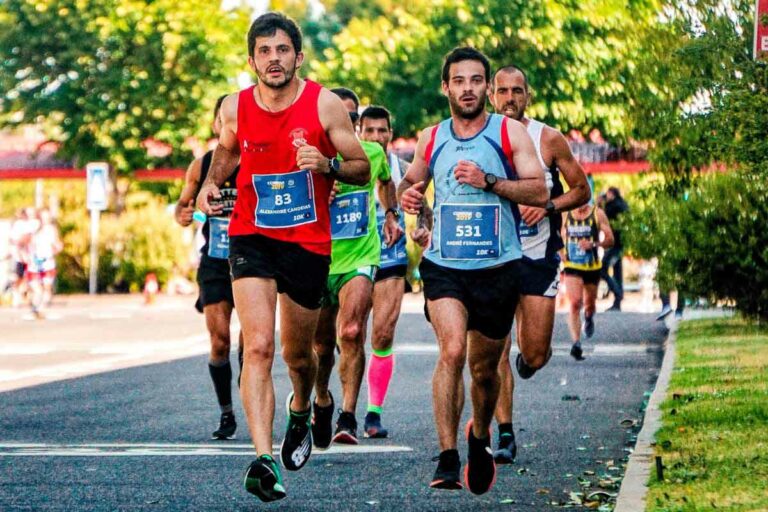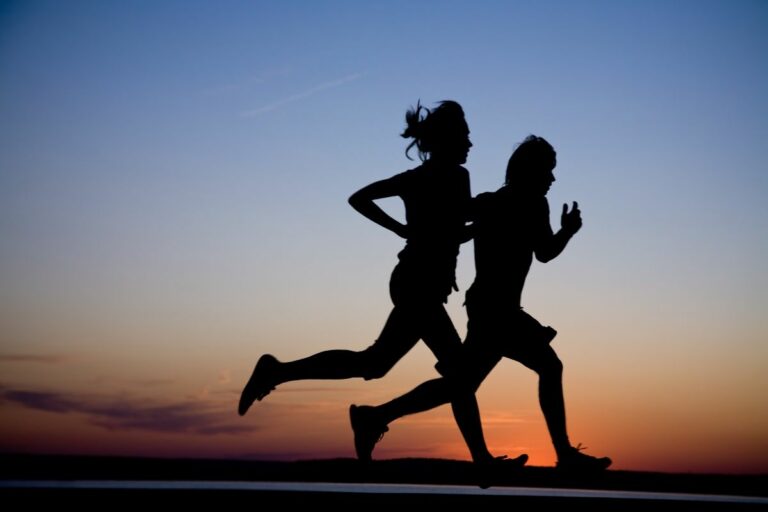Best Time to Run: Is It Better to Run in the Morning or Evening?

One of the most common questions we get asked is probably when is the best time to run?
There are some TYPICAL times when people head out for a run: early in the morning (6 to 7 am), late in the afternoon (3 to 5 pm), and in the evening (6 to 8 pm).
So which of these times is best for you? Let’s take a look at them.
Morning Runs
For many, the best time to run is between 7 am and 9 am. This is the ideal window of opportunity because you’re still FRESH and RESTED.
But not all prefer to exercise in the morning. It’s understandable, as a morning can be CHALLENGING for many reasons:
- You may live in an environment where it is unsafe to run because it’s dark and damp.
- Your work pattern doesn’t allow you the opportunity to have as much energy in the morning.
- You simply are not a morning person. You should not force yourself to run in the morning if you are not used to getting up early.
There are many benefits to running in the morning:
- Aah, that morning air in the summer! There is higher OXYGEN content in the morning air which makes breathing easier.
- There is less traffic and noise in the morning (well, it must be very early in the morning then).
- You are starting your day off with one of the healthiest activities you can do.
- What better way to start your day than to check one of the day’s most important activities off the schedule.
Note: Your body loses a great deal of water while you sleep. Learn how to hydrate for your morning run.
If your life situation only allows you to start exercising in the morning, you can get your body used to it. You can start with a short 30-minute run. Within a couple of months, you can usually practice without any problems.
And have you noticed? Early risers tend to defend their own choice of the best running time most passionately!
Afternoon Runs
Late afternoon would be the most suitable time for a high-intensity run. You will get the best results when your body temperature is the highest.
Pros for afternoon run:
- It can give you a nice break for a day.
- Factors that help exercise, like core body temperature, hormone levels, and breathing capacity, are at their peak (so if you run out of breath easily when running, try afternoon runs).
- Generally, it’s safer, and you won’t be caught in the dark. You’ll be running when there are others outside.
- At higher latitudes, it might be the only time you can run during the winter when it’s not dark.
Cons for afternoon run:
- It can be challenging to time your meals.
- On a busy day, finding time can be difficult.
- Work and family obligations may prevent many of us from going for a run around this time.
Your core body temperature will peak at around 5 pm, which in THEORY is the best time to go for a run.
Evening Runs
There are naturally some benefits to running in the evening:
- You are not limited by the time, as you probably have finished work by then.
- It’s a great way to relax after a long day at work.
- Many find they have the best performance due to peak lung capacity to sustain long runs.
- It’s easier to hydrate for an evening run than for a morning run.
Running in the evening has some risks:
- It is not a good idea to do hard training too late in the evening. You may have difficulty falling asleep and getting a good night’s sleep, affecting your ability to recover.
- If you DON’T have time to eat after your evening run, you won’t be able to recover properly.
In terms of overall performance, evening runs might be good for you as they help lower blood pressure. That may benefit other areas of life such as stress levels and sleep.
Misconceptions Of Running At Different Times

Now we’ve explored the differences between running in the morning and running in the evening, it’s worth highlighting some of the biggest misconceptions about running at specific times of the day.
There are clear differences between running early in the morning or late in the evening. But there are some misconceptions going out.
One of the MISCONCEPTIONS is that you will lose more weight running at a certain time of day.
- This is typically suggested with morning runs, especially what is known as fasted cardio.
- The idea is that your body will burn fat in the absence of carbs and protein.
- While you will burn more fat during this period, the problem is you will compensate by eating food after your run.
- In other words, even if you skip breakfast and go for a run you’re still going to follow the same rules of physics as everybody else.
The secret to losing weight is to consume fewer calories than your body expends over a given period.
So suppose you skip breakfast but eat more calories throughout the day? You won’t be any better off than those who ate before they ran but were mindful of how many calories they consumed throughout the day.
Another common MISCONCEPTION is that you will build more muscle running in the afternoon or early evening than in the morning.
- This is down to testosterone and cortisol levels being high in the morning, and the testosterone benefits of muscle building being negated by the cortisol.
- The truth is that to build muscle, you need to ensure that you are progressively overloading the muscle over time. That means lifting a little more weight or doing a few more reps, as well as consuming enough food to facilitate muscle growth.
In other words, whether you run in the morning or the evening will not matter nearly as much as progressive overload and calorie surplus.
Circadian Rhythm
When we dive into whether we should run in the morning or in the evening, we need to understand our body’s natural clock, i.e. the circadian rhythm.
- During 24 hours, your body will naturally respond to the rising and setting of the sun.
- This will naturally change how much energy you have, from kicking you out of bed in the morning, to releasing melatonin and relaxing you in the evening.
- This goes the same for energy stores and when your body should exercise.
The peak of the core temperature is around 5 pm. You have an increase in blood flow, which will reduce your chance of injury. You have better lubrication of the joints, more oxygen to channel around the body, and a better breakdown of glycogen and glucose for energy.
The Bottom Line
We all have different preferences regarding the best time to run.
Some people enjoy running in the morning, while others find it a nightmare.
You must find what works for you depending on your priorities and schedule.
So the best time to run is whenever you can fit into your schedule, and you will do it CONSISTENTLY.





